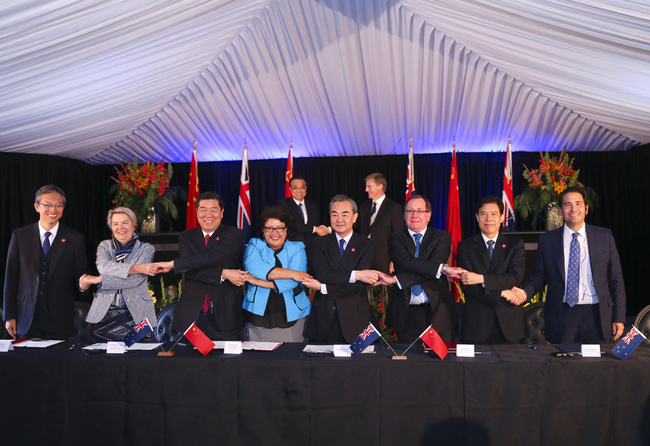Premier Li's Oceania tour another win for free trade

By Shafei M. Hali
The land down under is unarguably the most important piece of real-estate in the Asia Pacific region. Over the years Chinese relations with New Zealand and Australia have been gaining new highs with each passing year.
China is already the largest and most significant trading partner for both the countries. If we peak in to the figures from 2016, China sustained its position as Australia's leading trading partner, with two-way trade at US$114.5 billion. China's bilateral trade with New Zealand touched 14 billion U.S. dollars in 2016 and it goes without saying that China is New Zealand's largest trading partner. Though China attained the title of being the largest trade partner of New Zealand 3 years ago and China over took Japan as the largest trade partner of Australia back in 2007.
Thus Premier Li's recent trip to the land down under was not merely to strengthen already existing trade ties but to advance the relationships to a new level of partnership and show to the world that free trade has compounding benefits for those who engage in trade openness.
We as global citizens are passing through a trying time, when the global economic growth is registering lethargic growth rates, the traditional global power houses are exhibiting signs of moving towards populism, protectionism is being promoted by events such as Brexit and the Trump presidency. Oceania is not exempt from feeling the flux of these events.
Thus, in times of confusion and uncertainty friends and close partners come together to safeguard each other's interests. This is the reason why at the invitation of Prime Minister Malcolm Turnbull of Australia and Prime Minister Bill English of New Zealand, Premier Li Keqiang, recently traveled to Australia for the fifth annual meeting with the Australian prime minister and then visited New Zealand from March 22 to 29.
Following the election of Donald Trump and the majority vote for Brexit point towards an anti-globalism stance and this stance creates uncertainties for the framework of trade openness, this is why Australia feels the displeasure of the shattering of the Trans Pacific Partnership process but with Premier Li's visit these disappointments can be set aside as Premier Li's visit strengthened the hopes for the establishment of Regional Comprehensive Economic Partnership (RCEP) and discussions for a Free Trade Agreement of Asia and the Pacific (FTAAP). Premier Li's said;
"First, I have come for free trade. The world is seeing a rising tide of trade protectionism and growing backlash against globalization, we are ready to enhance relevant cooperation with Australia and demonstrate to the region and the world our determination to uphold trade liberalization and economic globalization."
Premier Li's words not only lifted the spirits of the Australian business community but strengthened the commitment and confidence in enhancing trade. The Chinese Premier's visit to Australia resulted in strengthening the ties in the fields of energy, resources, infrastructure, agriculture, animal husbandry, scientific and technological innovation, education, culture, tourism, security, law enforcement, anti-corruption and defense. The Australian trip made by the Chinese Premier resulted in a win for globalization and trade openness as two countries settled for joint commitment to an open world economy, and continued commitment to advancing global and regional trade and investment liberalization through the WTO, APEC and Regional Comprehensive Economic Partnership (RCEP).
The next leg of Premier Li's Oceania tour took place in the land of the Kiwis. Like with Australia, this year marks the 45th anniversary for China's diplomatic ties with New Zealand. Premier Li very aptly summarized the importance of China and New Zealand relations when he said;
"China-New Zealand relations have created many "firsts" over the past years, among which the most noteworthy is the signing of the China-New Zealand Free Trade Agreement (FTA)." It is one of the highest-standard agreements signed between China and developed countries.
Premier Li's visit to New Zealand marked the strengthening of the existing historic FTA between the two countries. The current FTA was signed almost 8 years ago and since the enactment of the FTA, bilateral trade almost between the two countries tripled, with a 13 percent surge each year. It is noteworthy that despite sluggish global economic growth, China and New Zealand trade ties have yielded remarkable results. The upgradation of the FTA will not only mean that previous growth standards will continue but will definitely witness compounding growth in the years to come.
As mentioned above and also by Premier Li that, anti-globalism and protectionist sentiments are gaining traction in the world but the achievements made during Premier Li's trip to Australia and New Zealand are a paragon of trade openness. The world needs to learn from such examples and should refrain from protectionism. China's important role in promoting free trade and strengthening international cooperation has become the hallmark of the current Chinese leadership and Premier Li's Oceania tour is proof of appreciation for China's endeavors for promoting free trade.
The Author:
Shafei Moiz Hali has a master's degree from George Mason University, Virginia, USA in the field of International Commerce and Public Policy. Mr. Hali has been working as an Assistant Professor at the National Defence University (NDU), Islamabad, Pakistan with the department of Government and Public Policy Since 2009. Currently he is pursuing his PhD from the College of Public Administration at the Huazhong University of Science and Technology (HUST), China.






